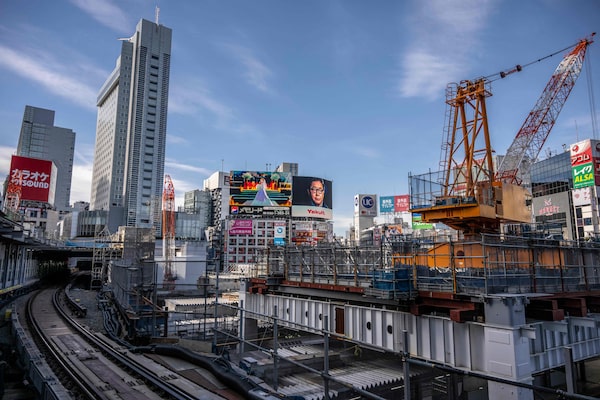
Shibuya station is pictured under construction in Tokyo on Jan. 1. Japan's rapid postwar economic growth sucked millions of people into cities and drove up property values. Eventually, the bubble burst and the country has run up a massive stock of government debt to keep the economy going.YUICHI YAMAZAKI/AFP/Getty Images
John Rapley is a political economist at the University of Cambridge and the managing director of Seaford Macro.
In the early days of the pandemic, as Italian hospital wards overflowed with dying patients and panic spread through Western countries, we heard a recurring warning: If it’s this bad in rich countries, just imagine the catastrophe that awaits poor ones. Then a funny thing happened on the way to the catastrophe: It never appeared. By and large, even accounting for their sometimes limited data collection, poor countries fared relatively well in their pandemic management.
In Africa, this came down, in part, to the relative youth of the population, but it also had something to do with being poor. Rich countries were initially complacent about public-health measures such as masking, thinking their advanced health care systems could cope and that their top-notch scientists would soon develop a vaccine. Countries deprived of these luxuries knew their only hope was the one thing they could do: rapid and aggressive public-health management. Ghana, for example, had controls at the airports and staff in full protective gear while Europe’s restaurants and bars were still packed.
For once, it paid to be poor. This unexpected edge turned up in the economics of the pandemic as well. With their deep pockets and access to cheap credit, rich countries were able to avoid economic collapse with generous support programs. Poor countries had to let their citizens fend for themselves. But while poor countries consequently took bigger hits, by and large, they’re now bouncing back quicker. For one thing, they haven’t exited the pandemic with all the debt that’s now burdening Western countries.
You see, being rich gets pricey. Think of it as the difference between building and fixing a bridge. A new bridge opens up channels of trade and communication, reduces transportation costs and thereby boosts overall output. But once it’s there it has to be maintained. If it isn’t, it will eventually collapse; and if that happens, the local economy goes backward.
It’s the wealth paradox – the more you have, the more you need. As an economy gets richer, the government is forced to spend more money to shelter it from sharp falls because the damage will be relatively greater. Since the 1980s, the amount that Western governments have spent in fiscal and monetary stimulus during recessions has risen from an average 1 per cent of GDP to 12 per cent at the time of the 2008 financial crisis and a whopping 35 per cent at the time of the pandemic.
But while these rapid responses have made recessions less frequent, and less deep, they’ve done nothing to restore the health of Western economies. On the contrary, the trend growth rate of those economies has continued remorselessly downward all the while and is now approaching zero. Which raises a question: Will the cost of staying rich eventually eat into the stock of wealth?
Japan’s experience may suggest so. The country’s rapid postwar economic growth sucked millions of people into the cities, driving up property values to the point that, at the peak of the boom, the land under the Tokyo Imperial Palace was worth more than the entire state of California. Japan had become wealthy beyond compare. But of course, prices like that drove up the price of everything else, to the point that Japanese cities began to lose business to other Asian destinations. Eventually, the bubble burst.
Since then, the country has run up a massive stock of government debt to keep the economy going, essentially running a tab to keep the lights on. Britain now finds itself in a similar situation, though it has resorted to a different fix. Instead of running up debts, the government has been running down stock, covering the rising cost of public services by slashing infrastructure and maintenance budgets. Consequently, the government’s net wealth has been falling. Yet in both countries, the economies are moribund, and Japan holds a clue as to why.
Asset-price bubbles, such as the dot-com or recent green bubbles, can leave dynamic new firms in their wake. In the history of capitalism, bursting bubbles have caused what Austrian economist Joseph Schumpeter called creative destruction, which posits that as inefficient firms collapse, dynamic ones pick up their clients and assets, and capital gets reallocated to the winners. In contrast, real estate bubbles, such as Japan’s, create no new firms or technologies. And when they burst, they leave a lot of angry property owners in their wake.
Governments and central banks are reluctant to let creative destruction go to town on so many people, so they tend to bail them out. That’s just what Japan has been doing, allowing “zombie companies” to stay alive. It’s therefore telling that the share of real estate in the wealth of Western countries has been rising over time. As we get richer, our readiness to let economic cycles have their way diminishes, which seems to herald a future of slow growth. Are we thus doomed to eventually fall into the trap in which Japan and Britain now find themselves?
 John Rapley
John Rapley